Welcome back to Reading the Weird, in which we get girl cooties all over weird fiction, cosmic horror, and Lovecraftiana—from its historical roots through its most recent branches.
This week is our 400th post, and by tradition we’re watching the weird: 1991’s Cast a Deadly Spell, screenplay by Joseph Dougherty and Martin Campbell directing. Spoilers ahead!
Los Angeles, 1948: everybody uses magic… except for Harry Philip Lovecraft, Phil to his friends, Schlubcraft to detractors. Lovecraft was a rising police detective until he could no longer stomach the corruption. His former partner, Harry Bordon, now prospers as owner of the Dunwich Room nightclub. Whereas PI Lovecraft is behind on rent to his landlady, licensed witch and dance instructor Hypolite Kropotkin.
Hypolite reports ominous portents. “You can feel the push, like something leaning on the screen door, trying to get in.” Lovecraft’s former boss, Morris Bradbury, also has a bad feeling. Lovecraft shrugs. At least he’s got a rich new client: Amos Hackshaw, tome collector and father to Olivia, last of the unicorn hunters. As Lovecraft approaches the Hackshaw mansion, he barely avoids her prey darting across the road with the blonde bow-wielder in pursuit. Rich people have weird tastes—further illustrated by the hideous gargoyle decorating Hackshaw’s roof.
Hackshaw’s Necronomicon has been stolen, probably by former chauffeur Larry Willis. Hackshaw needs it back by midnight a couple days hence. His other problem is keeping sixteen-year-old Olivia “pure.” Leaving, Lovecraft gets a sample of Olivia’s randiness: She invites him to join a ceremony to the goddess Diana, in the nude. He taunts her for playing seductress when she’s actually a unicorn-proved virgin, earning a resounding slap.
As Lovecraft drives off, we switch to the black-and-white aerial POV of the gargoyle, tailing his car.
At the Dunwich Room, an anxious Mickey Locksteader delivers a tome to Harry Bordon. Discovering it’s blank inside, Bordon sends his enforcer Tugwell after Mickey. Mickey’s run to the train station, where his flame Lilly Sirwar awaits. Tugwell and a zombie-bouncer chase Mickey to the men’s room. Mickey offers Tugwell money, only to find Bordon’s payment is blank paper—which Tugwell conjures into a whirlwind of death by a million paper cuts. Meanwhile Lilly retrieves a tome-like package from a locker.
At Willis’s gremlin-infested rooming house, Lovecraft finds a note with the letterhead “Bonita Vista, Michael J. Locksteader, president.” He also finds a Dunwich Room photo of Mickey and Lilly. Lovecraft heads to the nightclub; his jaw drops at the entrance of torch-singer Connie Stone. They reminisce about their past romance. Bordon, Connie’s current lover, belittles Lovecraft for eschewing magic and lucrative corruption.
Next morning Olivia apologizes to Lovecraft. He takes her to a diner. Tugwell, spying, gets the diner owner to deliver a rune-marked bill. Wise to “casting the runes,” Lovecraft forces it back on the owner, who’s killed by the resulting monster. This lands Lovecraft and Olivia in the police station, where Bradbury tries to re-recruit Lovecraft. Olivia flirts with detective Otto Grimaldi. Hypolite springs them, and warns Lovecraft that the Necronomicon is key to a world-ending door. She locks an unwelcome protective bracelet on him.
Lovecraft catches Grimaldi trailing him, and asks Grimaldi to watch Olivia instead. Back at Lovecraft’s office, Connie’s waiting. They argue about his refusal to play the magic game, but at least he has “no mortgage on his soul.” They kiss. Next morning Connie admits Mickey brought Bordon a fake Necronomicon, and Tugwell offed him.
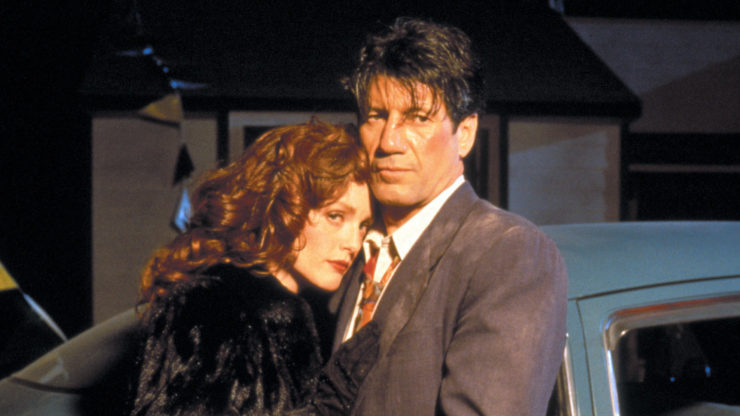
At Hackshaw’s, Olivia catches Grimaldi lurking and invites him inside.
At Vista Bonita, touted as the first magically built housing development, Lovecraft learns Lilly’s hotel address. Lovecraft and Connie head there. In Lilly’s room, Lovecraft punches her out and finds the real Necronomicon in her suitcase. Lilly, it turns out, is Mickey’s lover—and with her wig and women’s clothes off, passed as Larry Willis. (Note: the movie doesn’t specify whether Lilly is trans, male-IDed but cross-dressing, or some other point on the queer spectrum. Given her description of the wig as “my hair” and immediate demand for its return, we’re going with she/her.) Mickey planted Lilly in Hackshaw’s employ to steal the Necronomicon. They double-crossed Bordon, planning to sell the book back to Hackshaw in exchange for enough money to hide out from its use. Hackshaw and Bordon both want to release the Old Ones in exchange for vast power. The Old Ones’ price? A virgin.
Suddenly Hackshaw’s gargoyle breaks in. It kills Lilly and goes for Lovecraft. Connie shows up to distract it, and she and Lovecraft escape to her apartment. Unfortunately, Bordon’s there. Backed by Tugwell and the zombie-bouncer, he commandeers the Necronomicon and informs Lovecraft that Connie used him to find the real book. After the zombie drowns Tugwell in a bath for failing to get the book himself, Bordon cold-cocks Lovecraft.
Lovecraft reawakens in Bordon’s car, heading to Vista Bonita. Connie sits silent while Bordon describes his deal with Hackshaw. Matters will finally be settled between the former partners, and Lovecraft will live just long enough to see Hackshaw a god and Bordon the master of a ruined world.
Hackshaw meets them at the development, dragging a gagged Olivia. Before Bordon can hand the Necronomicon over, Connie shoots him. She’s the one who first corrupted Bordon, because incorruptible Lovecraft insisted on remaining an honest—and poor—cop. But she’d rather rule the world herself than be his pet. She’s about to shoot Lovecraft, but the zombie-bouncer breaks her hand. Hackshaw wants Lovecraft to see this. Necronomicon recovered, Hackshaw commences the ritual. Amid tempest and earthquake, Yog-Sothoth manifests. It seizes Olivia in eager tentacles, then rejects her and instead devours Hackshaw before subsiding into the earth.
It seems Hackshaw caught Grimaldi with Olivia and has brought him along—another snack for Yog-Sothoth? Lovecraft realizes that Grimaldi has saved the world by deflowering Olivia ahead of the virgin-sacrifice. He rejoins Connie, about to be arrested for Bordon’s murder. They share a last kiss.
Back office-side, Hypolite doctors Lovecraft. He’s had a tough week, but at least he knows that ordinary people are a little safer today, because—
Today, he’s got the book.
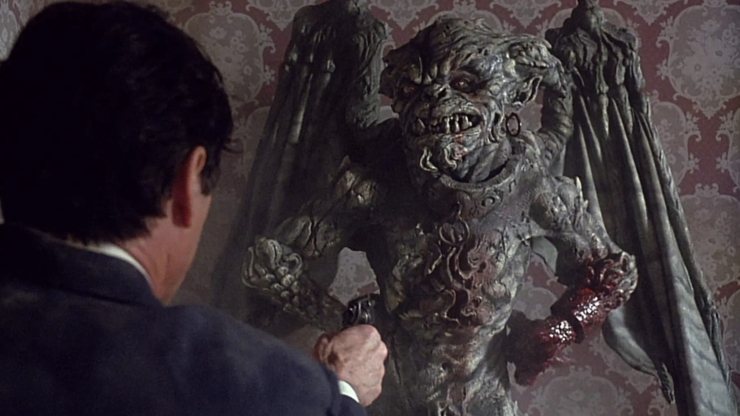
What’s Cyclopean: This version of Lovecraft is plain-speaking, likely to respond to a fulsome rant about strange aeons with “How long is that in dog years?”
The Degenerate Dutch: Imported Caribbean zombies are much more convenient than actual Black servants or slaves, who might—shudder—“get ideas”.
Weirdbuilding: Have you heard of the Old Ones? The Outsiders? Yog Sothoth? Cthulhu? How about Lovecraft and Bradbury?
Libronomicon: This version of the Necronomicon provides elder-god-summoning spells conveniently in English. Either that or Hackshaw is really good at on-the-fly translation.
Madness Takes Its Toll: Despite all the creatively bloody murders and potential apocalypses swirling around, everyone seems pretty sane. Some of them are just power-hungry assholes.
Ruthanna’s Commentary
To start with, any similarity to real persons, living or dead, is extremely coincidental. And really, isn’t that for the best? H.P. Lovecraft, b.1890, d.1937, only wished he were a man of action. He might therefore admire Phil Lovecraft, b.? but a world-weary mid-30s in alternate 1948, even as he shuddered at his alter ego’s willingness to touch, banter with, and rent rooms from African-Americans, Poles, brash women, brash African-Polish-American women, and other such scary types.
So: it’s 1948, and times are changing. Jazz, bourbon, and corruption are everywhere, and “everybody used magic.” In our reality, the world wars marked a shift in America’s culture and tech level; the gremlins may not have been the only development to come out of alternate World War II.
Buy the Book
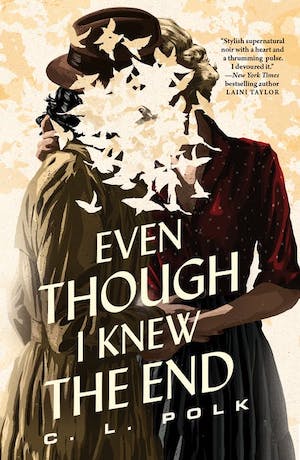

Even Though I Knew the End
Enter the private detective, an archetype that lets the audience enjoy society’s dark side, in the company of someone who’s seen it firsthand—and who may drink hard and talk cynically as a result, but hasn’t let it break their principles. The noir hero doesn’t deny change, but refuses to accept corrosion as inevitable. Such a hero meshes deliciously with a genre where the darkness goes even deeper.
This is not to say that the combination is easy. We’ve seen attempts at noir cosmic horror before, and seen them fall flat in a miasma of superficial similes and fish-eyed “dames”. Cast a Deadly Spell gets it, and makes both noir cynicism and cosmic horror work even while offering plentiful snickers.
It’s also wryly self-aware about the people dismissed or made monstrous by the originals genres. Kropotkin clearly pokes at original!Lovecraft’s fears of Polish-Americans, African-Americans, and the dangers of rooming in a Witch House—and clearly has her own story going on in the background. Meanwhile, post-war white society has taken up the use of 30-dollar-a-head imported Caribbean zombies, a steady supply of Black folk who “don’t eat, don’t complain, don’t get ideas.” Probably best not to ask what colonial force ensures that steady supply.
One of the background fears of noir is female agency: Spell is sympathetic to our desire to control our own lives, without declawing it. That desire can be deadly or world-saving:: from Olivia’s eagerness to escape her father’s control, to Kropotkin’s white magic and multiple-sources-of-income hustle, to Connie’s willingness to play useful men all the way to the top. (This movie has to work hard to fail the Bechdel Test, though as a point against it, it does in fact put in that hard work.) The madonna/whore complex puts the emphasis on complex: “ladies of the night” are literal vampires, and Olivia’s dad has horribly ulterior—one might even say Outer—motives for protecting her virginity. (I just caught that her father taught her to hunt unicorns as a check that his plan was working. Ew.)
And then there’s the queer couple driving the plot. They do die (it’s 1991), but they’re far from the only ones, and the camera seems entirely approving of both their romance and of Lilly’s trans-ness. You certainly can’t blame them for pulling a double-cross; in a world of people who want to become gods and evil overlords, all they want is a safe, cozy place to ride out the apocalypse—together.
Certainly they have better taste in romantic partners than Phil Lovecraft. The dame he can’t forget is in the hoosegow with the vampires and werewolves. All he has for comfort is a bottle of bourbon, and the knowledge that the world is little safer as long as the Necronomicon is on his desk.
Anne’s Commentary
Happy Four-Hundredth! As has become our custom for milestone blogs, we have treated ourselves to a weird movie night. Our last, From Beyond, I found more a slog than a treat. The same was true for my first viewing of Cast a Deadly Spell, but on a second viewing my experience improved to a mixture of amusement and exasperation. Only Julianne Moore as Connie Stone and Arnetia Walker as Hypolite Kropotkin were unmitigated delights, while Fred Ward provided a credible homage to noir-mode Bogart. The musical score was pretty good, too—Curt Sobel and Dennis Spiegel won an Emmy for Connie’s torchy showstopper, “Why Do I Lie To Me?,” and deservedly so.
I hoped this noir detective and Lovecraftian horror mashup would feature our own Howard Phillips. Personality-wise, the real Lovecraft would have been a pleasantly absurd choice for the private-dick lead, given how little inclined he was to snappy smartassery, fisticuffs, cynical romanticism, and incessant smoking and drinking. Apart from Detective Thomas Malone of “The Horror at Red Hook,” Lovecraft’s favored investigators were academics, librarians, and private scholars. If I were to type-cast HPL in this film, it would be as occultist Amos Hackshaw. Howard would have enjoyed having the means to acquire fantastically rare tomes, though he’d doubtless send the rebellious virgin to boarding school and keep cats as familiars instead of gargoyles. Overall, I was reconciled to a Harry Philip as lead. Some connection to a Providence cousin might have been fun, and useful in explaining movie-Lovecraft’s magic aversion. On the other hand, it was a good story decision to keep Phil Lovecraft Mythos-ignorant prior to his involvement with this plot. That way he could learn about the Lovecraftian stuff along with the viewers—a necessity, because I’m assuming the anticipated audiences for the film were far more detective/noir and general horror fans than hardcore Mythosians.
I imagine the filmmakers at an early production conference, drawing up one list of noir tropes essential to Cast and another of Lovecraftian tropes. The noir list is long and comprehensive, from the iconic characters through the atmospheric details. The Lovecraftian list? Not so impressive. It amounts to Lovecraft Lite, with the cleverest reference being not to Lovecraft but to M. R. James and “Casting the Runes.” Otherwise, we get the Necronomicon, Old Ones from Outside (Yog-Sothoth getting star mention), ominous Gates and Keys, Stars Coming Right (which leads to) the Return of the Old Ones and Destruction of the Human World, and Human Allies Dumb Enough to Think They’ll Profit by Said Return. Throw in gargoyles, zombies and gremlins for additional horror tropes. And Real Magic, not that stage stuff.
Right off, I wasn’t crazy about the film’s central premise. It’s baldly stated in the opening text: “Los Angeles 1948. Everybody used magic.” For one thing, magic universally used ceases to be magical, doesn’t it? For another, how did this situation come about? From Bradbury’s plaints, I infer that routine magic usage and invasive magical creatures are new problems, not the historical norm. So where did all this magic come from? Given we’re just post-WWII, did nuclear research and attacks on Japan trigger it, along with mutant giant ants and the like? Also, why is Phil opposed to magic, when he admits it’s the future? True, magic can corrupt. Worse, it makes the already corrupt exponentially more dangerous. But there are also good magic users, like Hypolite, and ultimately only magical law can defeat the Old Ones. The pertinent law here being that Yog-Sothoth ain’t coming back unless It gets a virgin appetizer.
The virgin thing always annoys me. Why would radically alien entities like the Old Ones care about the sexual experience of their victims? The “purity” schtick is such a human concern. Particularly a male human concern. Oh, and unicorns are also hung up on virginity. Hunting them is proof that Olivia’s “untouched.” Why should she hunt them? Just because she can, I guess. Bradbury doesn’t mention any scourge of unicorns, though I suppose they could be cantering around skewering random nonvirgins.
Then there are those $30 a head zombies from the West Indies, all Black as far as I recall. To make them such a cheap labor source, there must be a burgeoning zombification industry, amounting to a new-and-improved system of slavery. And poor Lilly. Gay or transgendered, she brings the worst out in Phil, who’s not such a perfect knight after all. That he’s not perfect is a noir thing, but I was sorry that his treatment of Lilly that had to showcase that imperfection. Curiously, the romantic relationship between Lilly and Mickey is the soundest one in Cast. Phil and Connie, for all their powerful chemistry, are genre-doomed from the start.
I’m hoping that Phil and Hypolite will get together now, because those two are sparking. And if anyone can reconcile Phil to magic, it will be his licensed witch landlady.
Next week, we continue N. K. Jemisin’s The City We Became with Chapter 11: Yeah, So, About That Whole Teamwork Thing.
Ruthanna Emrys’s A Half-Built Garden is now out! She is also the author of the Innsmouth Legacy series, including Winter Tide and Deep Roots. You can find some of her fiction, weird and otherwise, on Tor.com, most recently “The Word of Flesh and Soul.” Ruthanna is online on Twitter and Patreon, and offline in a mysterious manor house with her large, chaotic, multi-species household outside Washington DC.
Anne M. Pillsworth’s short story “The Madonna of the Abattoir” appears on Tor.com. Her young adult Mythos novel, Summoned, is available from Tor Teen along with sequel Fathomless. She lives in Edgewood, a Victorian trolley car suburb of Providence, Rhode Island, uncomfortably near Joseph Curwen’s underground laboratory.










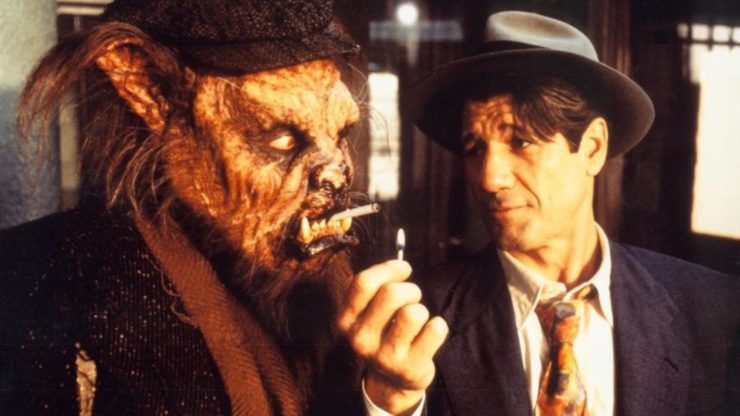
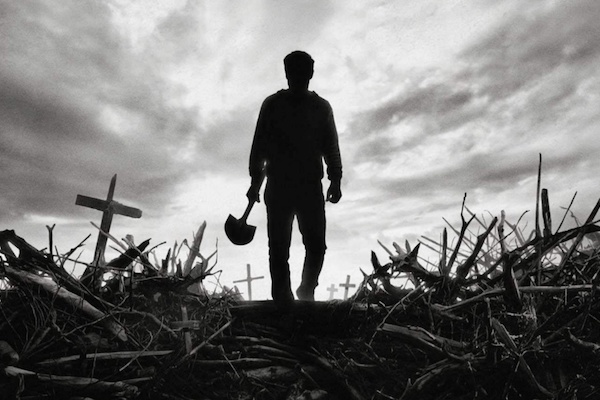
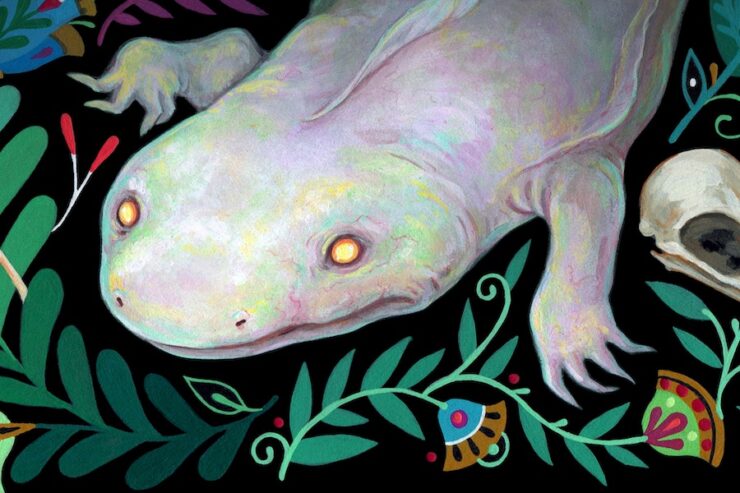

Truly one of the all time great movies. Sadly the sequel was not up to the original, so a series was never made. I still mourn to this day.
Many thanks to commenter RushThatSpeaks for the recommendation!
The only time I watched this movie several years ago I kind of liked it. It’s definitely a noir movie not a cosmic horror. The thing I found the most shocking is that she HUNTS the unicorns. It would have been simpler to waive a sign that said EVIL villain lives here. Poor unicorns. Congratulations on the 400th post.
Speaking alternate Lovecrafts, a web-serial by Paul Gazis, The Airship Flying Cloud, set in the interwar South Pacific, and in an alternate history where airships are more common, features a side-character who goes by the name of Howard Philips. Mr. Philips (he doesn’t use the L-name) freely admits that the decision to become a Pacific adventurer and some-time ship captain has greatly improved his mental and physical health. Though primarily a classic adventure story with lots of airships, it, too, has the occasional touch of the weird.
I remember fondly when this was first broadcast, and have been frustrated that there’s been little or no attempt to re-release it in easily accessible form (I think I have it on Laserdisc somewhere, and my Laserdisc player is buried in a storage unit).
It occurs to me that one other inspiration for this film might have been Robert A. Heinlein’s novella, “Magic, Inc.” which appeared first in Unknown magazine in 1940. It’s set in a contemporary USA where magic use is commonplace in construction, manufacturing, etc., but is otherwise no different from the “real world.” The story involves an attempt to get the state government to give a private corporation to “license” magic-users, effectively creating a monopoly, and the efforts to find out who’s behind it and stopping it. It also uses some “noir” conventions, such as the narrator being “shaken down” by a two-bit hood for using the “wrong” magic-user, and other tropes. It is also noteworthy for one the characters being a practitioner of African tribal magic who is a Black man portrayed in an entirely non-stereotyped way, highly unusual for pulp-magazine fiction at that time.
@6: It’s on HBO Max, but that might not count as easily accessible.
If there’s one thing we can practically guarantee, it’s that no Noir protagonist will wind up happily partnered – True Companionship is much more the stuff of Old School Detective fiction (Also, while I can’t possibly imagine who YOU rascals may be thinking of, you might like to know that I was thinking of Nick & Norah Charles from THE THIN MAN). (-;
@@@@@ 6: It is also available for rent or purchase on Amazon Prime Video.
Also on DVD, though I wouldn’t bother with a DVD unless it came with commentaries or extras.
AH!!! The sequel to this, 1995’s Witch Hunt, starring Dennis Hopper and Sheryl Lee Ralph, is a favorite of my childhood. Will you review that one, too? I bet you’ll love it! Eric Bogosian has an amazing monologue about the crumbling of the American Dream, and the cast includes Debi Mazar, the delightful Lipsynka, and a young Clifton Collins! Oh, it’s wonderful. I paid a fortune in the late 90s to have our VHS of it put onto DVD, that’s how precious it is.
@@@@@ 11:
Dennis Hopper, Clifton Collins, and LYPSYNKA?????!!!!!!!!!!
*scurries to Amazon*
Love this film much — and I don’t think the widespread magic makes it less magical. If anything, it adds to the film — they constantly show people doing little bits of magic in the background, like levitating a cocktail shaker or magically lighting a smoke.
I wondered about Phil’s fear of magic the first time I caught it, but I think it fits the Nobody Owns Me style of incorruptible PI well enough not to be an issue.
Fraser @@@@@ 13: I particularly loved the throwaway details at the police station: the magically automated typewriter, and the people doing the séance in the middle of the busy room, for example.
It felt to me like magic was tied to all the other cultural and technological changes post-war, and I could see where tech and magic and corruption would all get put into the same mental “you can’t stop progress, you’ve gotta play the game” box whether or not there was any metaphysical relationship.
@14: “magically automated typewriter”? Shades of Cronenberg’s version of Burroughs’ Naked Lunch!
I loved Cast a Deadly Spell for the most part, and had 2 major issues.
The first is the whole virgin business — the Outer Gods don’t care. A friend suggested that perhaps what they wanted was a different kind of virgin — one who’d never dabbled in magic, like, oh, Lovecraft. And perhaps Hackshaw wasn’t sure which he’d need, perhaps he thought he needed both, perhaps the one was a red herring for the other to mislead enemies. Except, not only wasn’t his daughter a virgin after all, but Lovecraft wasn’t either, thanks to the bracelet his landlady locked onto his wrist. I doubt it’s what the authors intended, but I like this, so it’s now my headcannon.
The second is that it seems highly unlikely that Tugwell wouldn’t be able to stop the zombie from killing him, given he’s the person who seems to be controlling them. I have a LOT of trouble believing he’d be that foolish. I’d rather Hackshaw killed him some other way, possibly after trying unsuccessfully to do death-by-zombie.
Everything else I can at least suspend my disbelief on.
flizzaraga @12
I’m so glad I could recommend it to you! Lypsinka really is delightful. I’ll never forget watching Black Swan and catching the piano player’s face, and thinking, hey… don’t I know you? :)
Thus Nick Charles’ determination not to get dragged back into the PI life, now that he is happily married to well-to-do Nora.
(Nick Charles’ ability to accept a rich wife vs Philip Marlowe’s: compare and contrast)
Fantastic movie that I honestly wish had been bigger. Weirdly, it reminds me of WHO FRAMED ROGER RABBIT more than anything else as the cartoonish urban fantasy environment contrasts so well with the film noir ambiance.
One of the most quotable movies ever made.
“If I had the money, I’d surely be in Miami.”
“I’m serious.” “Then why are you wearing that hat?”
“Good ol’ Phil, subtle as a flagpole.”
“If this is the future, I’ll take vanilla.”
“My god, Phil – there’s so much you don’t know about women.”
“Personal reasons.” “And they are?” “Personal.”
And no, the story would not be better, if Phil’s aversion to magic were explained. Not everything has to be explained; in fact, most stories benefit from unexplained aspects. Phil already told you as much as you need to know, which I quoted above: personal reasons. The fact that those are never explained makes him more real as a character, since it grants him something important – privacy. Just as we don’t know what drove Connie to become such a power-hungry monster, we don’t know why Phil won’t use magic, and that’s as it should be. When you cut the goose open, you lose the golden eggs.
Ah, love this movie. Remember seeing it on HBO when it premiered, when I was carrying around the S.T. Joshi hardcover collections of Lovecraft in my school bookbag. I still laugh whenever I see the zombie housing construction site.
Wow, amazing how different people view the exact same scenes in such a diametrically opposite manner! Ruthanna, what do you make of the following commentary, I wonder?
https://headstuff.org/entertainment/film/film-features/a-classic-with-a-fatal-flaw-cast-a-deadly-spell-at-30/
James @@@@@ 23: I can see Conliffe’s interpretation and it’s a reasonable one. But I saw Lilly called by name and with correct pronouns multiple times, and I felt like the camera treated her relationship with Mickey as real and meaningful. The slur is there, but in a context clearly intended as non-judgy slang, and it was also used commonly and casually (both as a slur and within the community) in 1991. As for Lovecraft punching Lilly, I interpreted that as “this person has the book, which I need in a hurry, and is unlikely to give it to me”. If it were ever suggested that he “never hits women,” I’d have interpreted it differently, but he’s generally pretty free with pragmatic violence across the board.
This may possibly be a generation gap, too – if I had watched this in 1991 (or more realistically, a few years later after I came out), it would have been by far the most sympathetic and accepting depiction of queer people I’d seen in any movie outside of those created by and for the queer community.
I believe WHAT WE DO IN THE SHADOWS (the movie) explained why Outer Gods and inhuman creatures of the night prefer virgins best: “It’s like if you have a sandwich. You just feel like eating it more if you know someone hasn’t [bleep] it.” However, the fact that the ritual is screwed up by the daughter being “loose” (*gasp*) in the Forties is also a check on the ridiculous old school values of the time as well.
After all, the world is literally saved by the fact our heroine is willing to get frisky. Indeed, the movie has quite a bit of critique of detective noir misogyny even though it indulges it a bit as well since Julianne Moore’s character quite rightly asks, “Why should I be the girlfriend to the man who will rule the world when I can be the woman who rules the world herself?”
But really I feel like the thing that most stood out from this movie for this writer of HP Lovecraft pastiche (which I hope you will someday read, Ruthanna, Anne!), is David Warner’s performance as a Lovecraftian sorcerer. In some alternate universe, Randolph Curwen/Charles Dexter Ward or Wilbur Whateley or even some entirely original cultist leader was played by the one true Ra’s Al Ghul and he brought the gravitas to saying the silly names that he brought here.
I’m extremely late to the game on this one, but I’m trying to catch up on the posts I fell behind on. And this one, I’m actually genuinely surprised by. Not because there’s anything wrong with it, but because I had no idea how heavily Joss Whedon ripped off this movie for an episode of Angel (Guise Will Be Guise, specifically) just a few years later, in 2000.